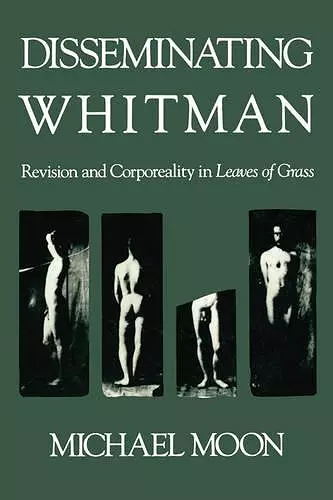Disseminating Whitman
Revision and Corporeality in Leaves of Grass
Format:Paperback
Publisher:Harvard University Press
Published:31st Jan '93
Currently unavailable, and unfortunately no date known when it will be back

Within twelve years of the first appearance of Leaves of Grass in 1855, Walt Whitman produced three other editions of what he insisted were the “same” work; two more followed later in his life. Rather than asking which of these editions is best, Michael Moon, in Disseminating Whitman, argues that the very existence of distinct versions of the text raises essential questions about it. Interpreting “revision” more profoundly than earlier Whitman critics have done, while treating the poet’s homosexuality as a cultural and political fact rather than merely as a biographical datum, Moon shows how Whitman’s continual modifications of his work intersect with the representations of male-male desire throughout his writing. What is subjected to endless revision throughout the first four editions of Leaves of Grass, Moon argues, is a historically specific set of political principles governing how the human body—Whitman’s avowed subject—was conceptualized and controlled in mid-nineteenth-century America.
Moon interprets Whitman’s project as one that continually engages in such divergent contemporaneous discourse of the body as the anti-onanist ones of the “male-purity” movement, anti-slaver writing, “temperance” tracts, and guides to conduct for the aspiring “self-made man.” Critically applying various interpretive models from psychoanalysis, literary and cultural theory, and gender studies, and heeding recurring patterns of language and figure, Moon provides rigorous intertextual readings of Whitman’s canon. Ingeniously employing “The Child’s Champion” as a paradigm, Moon scrutinizes such celebrated poems as “Song of Myself” and the great Civil War elegies, as well as such commonly overlooked poems as “Song of the Broad-Axe” and “Song of the Banner at Daybreak.”
Disseminating Whitman reveals as no previous study has done the poet’s fervent engagement with the most highly charged political questions of his day—questions of defining and regulating whole ranges of experiences and desires that remain the subject of intense political conflict in our own time. This radical reassessment of the “good gray” poet makes a definitive contribution to critical work in American history and literature, poetry, and gender studies.
ISBN: 9780674212459
Dimensions: unknown
Weight: 399g
249 pages